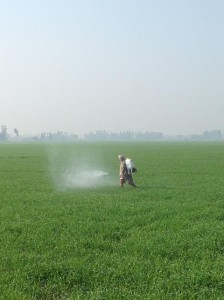 spraying without safety gear in punjab, dec 2013
spraying without safety gear in punjab, dec 2013
Recent shodhyatra in Punjab has given us new insights about the deepening crisis in agriculture growth and sustainability. The ominous signs were visible for quite some time. The agricultural science and extension system needs complete recast. Political parties can not sustain the declining profit margins in agriculture by more and more subsidies ( leading to non sustainable use of natuiral resources) though i am not against subsidies altogether. Obviously when Deputy Governor of Reserve Bank recently questioned the logic of subsides for the poor he did not look at the subsidies he himself gets in his house rent, transport and numerous other privileges. I as a professor pay a fraction of rent for my house compared to the market rate. That is also a subsidy. Medical reimbursements and other support civil servants and other public functionaries get are all available at taxpayers’ account. Having said that, free water and electricity do lead to over consumption and decline in water table in some cases worsening in water quality as well. We have to apply far more pesticides, fertilizer than a few decades ago because of declining soil fertility, predators of pests, increasing resistance of pests to the chemicals etc. It costs more energy to get same amount of water from deeper layers of ground water. How will it change?
Agenda for change:
We need to ensure that efficiency in agriculture is noticed, encouraged and rewarded. That is possible when experiments are taken up to reduce costs of cultivation by substituting chemical alternatives by herbal and agronomic ways of pest control and fertility management. Similarly, low cost approach of treating animals will have to be adopted. Fortunately not all-traditional knowledge is lost in many of the green revolution regions. Shamsher Singh knew the use of coriander for controlling mastitis in animals in Bharon village. He learned it from his grandfather. He did not use it. But then a paper was published validating this use in Iraq in September, 2012. We can ignore it and thus impose the non-sustainable costs on the farmers, strain on farmers, and adverse effects of residues on consumers. The site SRISTI.org/hbnew has a huge database of thousands of sustainable practices developed by the innovative farmers besides the HBN database of NIF. But who will diffuse these open source knowledge base?
There is a strong desire on the part of farmers, many of very wealthy ones, to change course but they have lost the will to experiment, though it was this very spirit which led to green revolution. We have to trigger the experimental spirit once again.
Not in one village did we find any agro-industry unit to process the village produce. How could the next level of transition be made without having in situ value addition. The agricultural universities have to strengthen food processing departments, involve private sector to help set up small distributed production, packaging and distribution units, and mobile quality control labs will have to be set up to ensure highest standards of quality and safety. It is a pity that after six decades we should still be pleading for this rather than scaling these up.
We discovered many farm machinery innovations but there was and is no agricultural angel and venture fund. The Distrcit Innovatiin Fund requires proposalt o be sent yo Delhi or state capitals in some cases. In Gujarat the proposals have to be sent to finance ministry, Delhi –really an absurd requirement. That was not the purpose when we developed the idea and it was approved by 13th Finance commission. Why do we not trust a collector and a local committee constituted by him for just one crore fund? We could invest in a variety of machineries, which need to be developed further. No farm machinery has electronic sensors and thus the control or feedback systems. How can we move towards precision farming, a need of the hour.
The whole technological, institutional and socio-economic infrastructure needs fresh thinking of we want to save soils, souls and the spirit of the bread basket of our country. let us see which political party will like to bell the cat?
